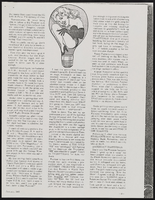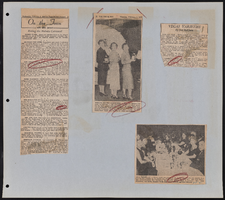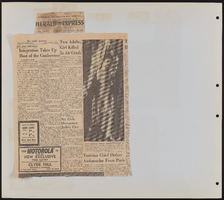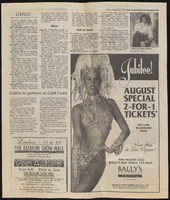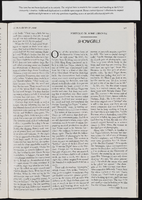Search the Special Collections and Archives Portal
Search Results

Transcript of interview with Betsy Fretwell by Claytee White and Stefani Evans, August 30, 2016
Date
Archival Collection
Description
Shortly before the University of Georgia granted Betsy Fretwell Master's degree in public administration in 1991, she applied for a one-year internship with Clark County, Nevada. The County hired her, but Fretwell did not complete her internship. Instead, the County promoted her, hired her full-time, and soon had her lobbying for the County's interests in Carson City. Her insistence on learning all sides of a question and communicating that knowledge to the decision makers was one of the skills that made her so valuable to Clark County administrators. In this interview, Fretwell discusses her South Carolina childhood, her affinity for the University of Georgia Bulldogs, and the path she took to occupy the office of city manager for the City of Las Vegas. She talks about her years at Clark County and a term at the City of Henderson, but she mostly focuses on her sixteen years at the City of Las Vegas, first as assistant city manager under Virginia Valentine and later as city manage
Text

Transcript of interview with Paul Huffey and Michael Mack by Claytee White, February 2, 2010
Date
Archival Collection
Description
Whenever Paul Huffey drives through John S. Park Neighborhood he visualizes his youth and the times he spent with his childhood friend Michael Mack, who joined in this interview. Together they reminisced about their teen years in the 1950s and living in John S. Park Neighborhood. Paul's first home was Normandie Court, the first authentic motel in Las Vegas. In 1947, Paul's father purchased a lot on Paseo Park and built a home for his wife and only child. He describes life in that home as idyllic: no war or unemployment issues, a time when the Strip was "meaningless" unless you had a parent working there. An era when mothers, at least in his neighborhood, were stay-at-home moms and children freely roamed on their bicycles. Of their teen years, Paul and Michael recall their hi-jinks, discovering beer, and admiring pretty girls. In 1956, he graduated from Las Vegas High School, enlisted in the U. S. Army Reserve and enrolled in University of Nevada Reno. He taught history at Basic High School in Henderson for nine years.
Text

Transcript of interview with Howard & Dorothy Cannon by K.J. Evans, September 28, 1998
Date
Archival Collection
Description
On September 28, 1998, K.J. Evans interviewed former United States Senator Howard Cannon (born 1912 in St. George, Utah) about his life and political experiences. Also present were his wife, Dorothy Cannon, his daughter, Nancy Downing, and another participant identified as Caroline Rose. Cannon first talks about his family background and his parents’ occupations before mentioning his involvement in a music band and his pastime of flying aircraft. He then discusses his first political involvement and mentions his work for the Las Vegas City Attorney’s Office. Evans then asks about Cannon’s service with the Air National Guard and his combat experiences during World War II, specifically on D-Day. The interview then moves to a discussion on some of the work Cannon fulfilled as a senator, particularly military-based projects and black projects, and his work in creating Nellis Air Force Base. Evans later asks Cannon questions about his interaction with presidents, his thoughts on the Vietnam War, his support for civil rights, and his politically liberal stance as a lawmaker. Cannon also provides details on his relationships with Senators Walter Baring and Alan Bible, his interaction with Lyndon B. Johnson, and his campaign against Chic Hecht.
Text

Interview with Jacob "Chic" Hecht, May 11, 2004
Date
Archival Collection
Description
Text

Transcript of interview with Renee Marchant Rampton by Dr. Caryll Batt Dziedziak, September 25, 2015
Date
Archival Collection
Description
Renee Marchant Rampton has often referred to herself as "One of Fifteen." Indeed, growing up in a family of fifteen children, Renee experienced the care of loving parents, the excitement of a bustling household, and the engagement of an active Church; all amidst the strains of a depression era economy. Renee's mother, Beatrice Marchant, provided Renee with a strong role model with which to emulate; a disciplined woman, who rose to the task without hesitation. Beatrice became the family's provider after her husband's debilitating stroke and later served in the Utah Legislature during the 1970s. Renee loved music from an early age. As a young child she found an early job as a piano accompanist for a dance studio. In 1956 she married musician, Roger Rampton, a successful percussionist. They soon settled in Las Vegas, where Roger performed on the Strip and they began raising their four children. It was an exciting period in Las Vegas history as the Strip attracted musicians and
Text

